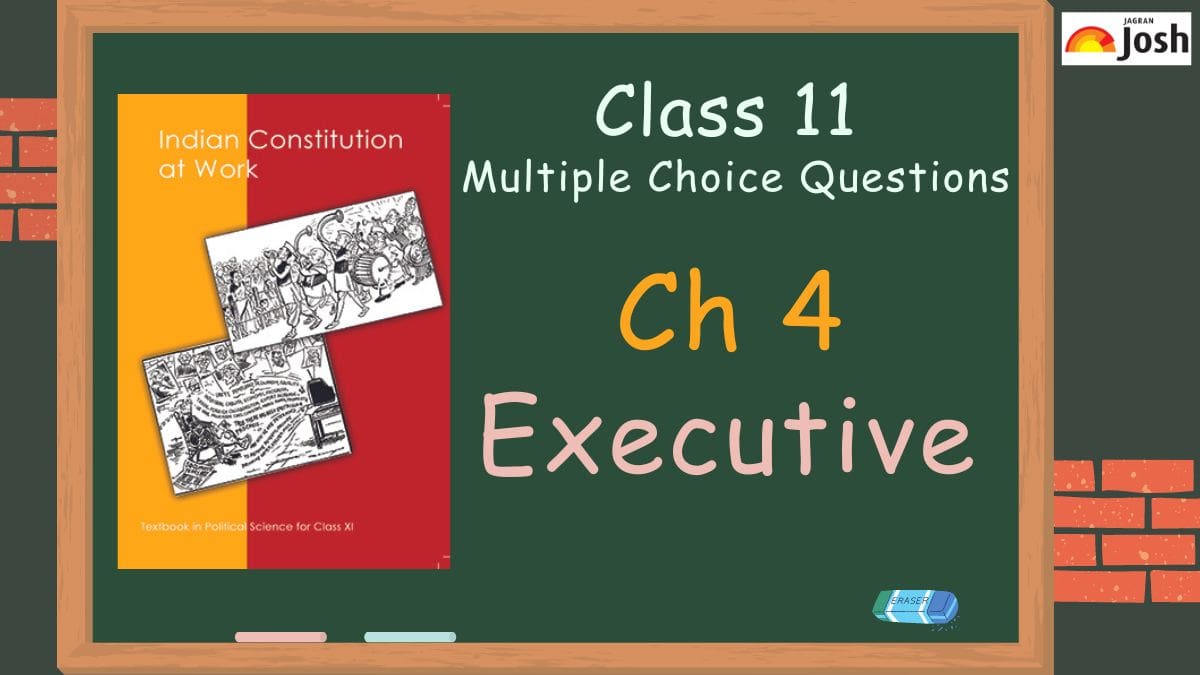Jagran Josh
Executive Class 11 MCQs: As students of Political Science and also as informed and responsible citizens of the country, all of us must know about the principles and ideas of the Constitution of India which stands as the base of the laws, rights, duties and responsibilities for the Indian Citizens and the Indian government. This article provides a comprehensive list of 10 MCQs prepared for revision of Chapter 4 – Executive of the Class 11 NCERT book on Indian Constitution at Work. The PDF is also available to download. Click the link at the end of the article to download the PDF.

CBSE Executive Class 11 MCQs
This article presents a set of 10 multiple-choice questions (MCQs) designed to test and reinforce understanding of the fundamental concepts covered in Chapter 4 – Executive of the NCERT Indian Constitution at Work book of Class 11. These questions will help the students in their preparation for the upcoming examinations. Use these questions for revision; also check the answers in the answer key provided at the end of the article.
10 MCQs on Ch 4 – Executive
Here are 10 multiple-choice questions based on Chapter 4 – Executive from the NCERT book for Class 11 – Indian Constitution at Work:
Question 1:
Who is the nominal head of the Indian executive?
- a) The President
- b) The Prime Minister
- c) The Chief Justice of India
- d) The Speaker of Lok Sabha
Question 2:
The real executive powers of the Union are vested in:
- a) The President
- b) The Prime Minister
- c) The Vice President
- d) The Governor of Reserve Bank of India
Question 3:
The Council of Ministers is collectively responsible to:
- a) The President
- b) The Prime Minister
- c) The Parliament
- d) The Supreme Court
Question 4:
Who appoints the Prime Minister of India?
- a) The President
- b) The Vice President
- c) The Chief Justice of India
- d) The Speaker of Lok Sabha
Question 5:
The President of India is elected by:
- a) elected members of the Rajya Sabha
- b) elected members of the Lok Sabha
- c) elected members of each state’s Legislative Assembly, elected members of each union territory possessing a Legislative assembly i.e. Delhi, (Jammu & Kashmir not included) and Puducherry etc.
- d) all of the above
Question 6:
What is the maximum tenure of the President of India?
- a) 5 years
- b) 6 years
- c) 7 years
- d) 8 years
Question 7:
Which article of the Indian Constitution deals with the appointment of the Vice President?
- a) Article 61
- b) Article 64
- c) Article 65
- d) Article 66
Question 8:
Who acts as the ex-officio Chairman of the Rajya Sabha?
- a) The President
- b) The Prime Minister
- c) The Vice President
- d) The Speaker of Lok Sabha
Question 9:
What is the term of office for the Attorney General of India?
- a) 3 years
- b) 4 years
- c) 5 years
- d) No Fixed Term
Question 10:
Who administers the oath of office to the President of India?
- a) The Vice President
- b) The Prime Minister
- c) The Chief Justice of India
- d) The Speaker of Lok Sabha
ANSWER KEY:
- a) The President
- a) The President
- c) The Parliament
- a) The President
- d) all of the above
- c) 5 years
- d) Article 66
- c) The Vice President
- d) No Fixed Term
- c) The Chief Justice of India
Also Read – CBSE Chapterwise MCQs for History Class 11 NCERT from the Revised Syllabus (2023 – 2024)
#CBSE #Executive #Class #MCQs #NCERT #Indian #Constitution #Work #Chapter

